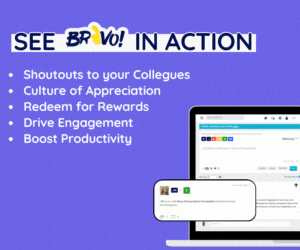
Engagement and loyalty are fundamental pillars of a thriving workplace culture that fosters productivity, collaboration, and long-term success. When employees feel engaged, they are emotionally committed to their work, genuinely caring about the organization’s mission and goals. Employee rewards programs play a crucial role in boosting engagement and fostering loyalty within the workplace.
Rewards programs are powerful tools for elevating employee engagement and nurturing long-lasting organizational loyalty. By offering tangible incentives and recognition for exceptional performance, rewards programs create a sense of employee appreciation and acknowledgment.
Such positive reinforcement motivates individuals to perform at their best and instills a sense of purpose and fulfillment in their work. These programs create a win-win situation, as employees feel appreciated and motivated, while the organization benefits from a more engaged and loyal workforce.
In this blog, we will focus on understanding how rewards programs contribute to an increase in workplace engagement and loyalty; let’s take the opportunity to discuss this subject thoroughly.
Understanding Employee Engagement and Loyalty
Understanding employee engagement and loyalty is paramount for any organization striving to achieve long-term success and a competitive advantage in the market.
Employee engagement goes beyond job satisfaction; it represents a deep emotional connection between employees and their work, fostering a sense of purpose, commitment, and motivation to contribute their best efforts to the organization’s goals.
Engaged employees are enthusiastic about their roles, willingly go the extra mile, and exhibit a genuine passion for their work, leading to increased productivity and overall performance.
As per Gallup’s survey findings, employee engagement yields significant advantages, including:
- A potential productivity surge of 14%,
- Enhanced customer ratings by 10%,
- A sales uptick of up to 18%,
- A remarkable 23% boost in profitability,
- A notable 13% rise in organizational participation.
Engaged employees are more likely to stay committed to the organization, resulting in higher retention rates. They become ambassadors for the company’s values and culture, speaking positively about their experiences within the organization to peers and potential talent.
It, in turn, helps attract new employees aligned with the company’s vision and goals, further reinforcing the organizational culture and enhancing the overall work environment.
A supportive and inclusive workplace environment is pivotal in nurturing employee engagement and loyalty. Employees who feel valued, respected, and empowered are likelier to invest their time and energy into their roles.
Managers and leaders should actively recognize and appreciate employees’ efforts and contributions, providing constructive feedback and opportunities for skill development.
Creating an open communication and transparency culture fosters trust and collaboration, allowing employees to feel heard and understood, positively impacting their engagement levels.
Organizations should also focus on providing growth and development opportunities for their employees. Career advancement prospects, training programs, and skill-building initiatives demonstrate the organization’s investment in its employees’ professional growth.
When employees see a clear path for their development and envision a bright future within the company, they are more motivated to stay committed and loyal.
Engaged and loyal employees are valuable assets and significantly impact overall business performance.
They are more attuned to the organization’s goals and are better equipped to align their actions with the company’s objectives. This results in improved collaboration, streamlined workflows, and a heightened ability to adapt to changes and challenges.
Read More: Building a Thriving Workplace Culture Through Employee Recognition Program
The Power of Employee Engagement
The power of employee engagement and loyalty cannot be underestimated. When employees feel genuinely connected to their work, organization, and values, they become powerful advocates for the company’s success.
Engaged employees are highly motivated and productive and go above and beyond to contribute their best efforts.
Moreover, their loyalty reduces turnover rates, saving significant costs associated with recruitment and training. Engaged and loyal employees create a positive work environment, fostering collaboration, innovation, and teamwork.
This positive atmosphere attracts top talent and enhances the company’s reputation, giving it a competitive edge in the market.
Ultimately, the power of employee engagement and loyalty translates into improved business performance and sustainable growth, making it a cornerstone of any successful organization.
Employee Reward Programs
Understanding employee reward programs is essential for organizations seeking to motivate and retain their workforce effectively.
Employee reward programs are strategic initiatives designed to recognize and incentivize employees for their exceptional performance, dedication, and contributions to the organization’s success.
These programs can take various forms, such as monetary bonuses, performance-based incentives, recognition awards, or non-monetary benefits like flexible work arrangements or professional development opportunities.
The key is aligning rewards with employees’ individual and collective achievements, reinforcing desired behaviors, and fostering a positive work culture.
Organizations can enhance morale, increase job satisfaction, and strengthen employee engagement and loyalty by recognizing employees’ efforts and offering tangible or intangible rewards.
A well-crafted and thoughtfully executed employee reward program can be a powerful tool in driving productivity and enhancing overall organizational performance.
Key Elements of Successful Reward Programs
The essential components of successful reward programs encompass a well-defined and transparent recognition process, ensuring timely and equitable acknowledgment of employees’ accomplishments.
These programs should be designed to align rewards with specific, measurable, and relevant performance criteria, establishing a clear link between exertion and appreciation. Offering diverse monetary and non-monetary incentives is crucial to satisfy employees’ preferences and motivators.
Effective communication is paramount, enabling employees to comprehend the program’s objectives and the pathways to qualify for rewards.
Moreover, continuous evaluation and feedback are pivotal in refining the reward program over time, ensuring its effectiveness and relevance.

By integrating these essential elements, organizations can create a robust and influential reward program that nurtures employee motivation, engagement, and loyalty, ultimately driving overall performance and success.
Read More: 11 Great Examples of Employee Reward Program Ideas
Types of Employee Reward Programs
Employee reward programs come in various forms, tailored to meet the diverse needs and preferences of the workforce.
One common type is the monetary reward program, which includes bonuses, performance-based incentives, and profit-sharing plans, providing tangible recognition for outstanding achievements.
Non-monetary reward programs offer employees intangible benefits, such as flexible work hours, additional vacation days, or opportunities for skill development and career advancement. Recognition-based programs emphasize acknowledging employees’ efforts through verbal praise, certificates, or public acknowledgments.
Additionally, wellness programs that promote physical and mental well-being have gained popularity, including gym memberships, health screenings, and stress management initiatives. Combining these reward programs can create a comprehensive approach that fosters employee satisfaction, engagement, and loyalty, contributing to a positive and thriving work environment.
How Employee Rewards Programs Promote Engagement and Loyalty?
Employee rewards programs significantly promote employee engagement and loyalty within an organization. These programs offer various incentives, recognition, and benefits to employees for their hard work, achievements, and contributions to the company.

Here’s how employee rewards programs promote engagement and loyalty:
- Recognition and Appreciation: Employee rewards programs often include public recognition and appreciation for employees’ efforts and accomplishments. When employees receive acknowledgment for their work, they feel valued and motivated to continue performing at their best.
- Intrinsic Motivation: Non-monetary rewards, such as verbal praise, certificates, or personalized thank-you notes, tap into employees’ intrinsic motivation. This type of motivation comes from within and fosters a sense of pride in their work, increasing engagement and loyalty.
- Sense of Achievement: Employee reward programs set clear employee performance standards and goals. Meeting or exceeding these goals gives employees a sense of achievement and fulfillment, boosting their commitment to the organization.
- Increased Job Satisfaction: When employees are recognized and rewarded for their efforts, they experience higher levels of job satisfaction. Satisfied employees are likely to remain committed to their jobs and loyal to the organization.
- Enhanced Team Spirit: Team-based rewards encourage collaboration and cooperation among employees.

When employees work together toward shared goals and are rewarded collectively, it strengthens team spirit and encourages loyalty to the team and organization.
- Attraction and Retention of Talent: Well-structured employee reward programs can attract top talent and retain existing employees. Prospective employees often consider the benefits and rewards when deciding where to work. In contrast, current employees are less likely to seek opportunities elsewhere if they feel recognized and rewarded for their contributions.
- Sense of Fairness and Equity: A fair rewards system ensures employees believe their efforts are recognized and rewarded appropriately. This perception of fairness enhances employee satisfaction and loyalty.

- Motivation for Continuous Improvement: Employee reward programs can be tied to skill development and improvement initiatives. Offering rewards for enhancing skills or achieving specific milestones encourages employees to engage in continuous learning and self-improvement, benefitting both the employee and the organization.
- Positive Organizational Culture: Employee rewards programs contribute to a positive organizational culture that values and appreciates its workforce. Such a culture fosters loyalty and a sense of belonging among employees.
- Retention and Reduced Turnover: Engaged and loyal employees are likelier to stay with the organization over the long term. It reduces turnover and saves the company recruitment and training costs while maintaining a stable and experienced workforce.
Overall, employee rewards programs go beyond monetary compensation and play a vital role in building an engaged and loyal workforce. By recognizing and appreciating employees’ contributions, setting clear goals, and fostering a positive work environment, these programs contribute to a more committed and motivated workforce dedicated to the organization’s success.
How Can Bravo Help to Improve Employee Engagement?
BRAVO, an AI-powered employee engagement platform, promotes employee engagement and loyalty. Through its user-friendly interface and diverse features, BRAVO fosters a culture of recognition and appreciation within organizations. Employees can easily recognize their peers for outstanding contributions and achievements, leading to increased motivation and a sense of value in their work.
BRAVO fosters engagement and cultivates unwavering loyalty through its ingenious employee reward programs. By recognizing and appreciating the dedicated efforts of its workforce it helps to create a workplace culture that is both motivating and gratifying.
The company’s reward initiatives go beyond mere incentives; BRAVO helps organizations manage employee rewards and recognition programs.
Through these employee reward programs, BRAVO demonstrates its commitment to valuing employees as integral assets, nurturing their growth, and ensuring their well-being. This approach not only enhances motivation and job satisfaction but also establishes a strong bond of loyalty between the employees and the organization, resulting in a harmonious and productive work environment.
If you want to take advantage of reward programs to boost your employee’s engagement and loyalty, book a demo today to learn how BRAVO can help you to launch a reward program in your organization.






